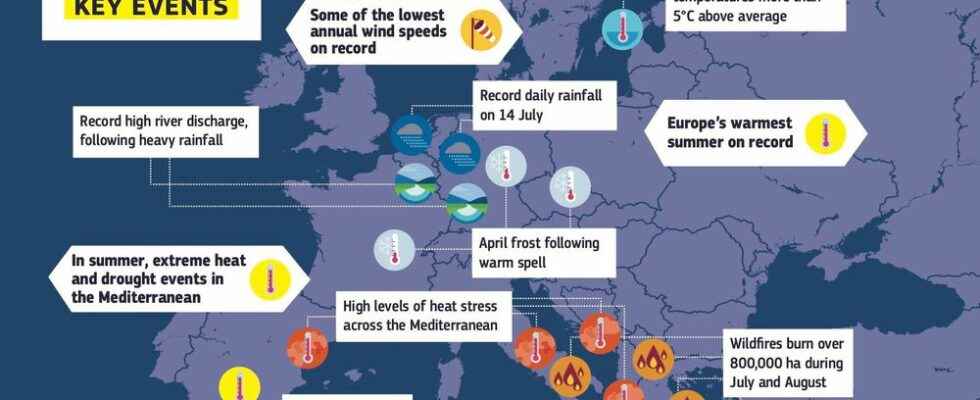Summer temperatures continue to climb and there is nothing to rejoice about. According to the latest report from the European climate change monitoring service, Copernicus, the summer of 2021 tops the hottest summers recorded in Europe for 150 years. In June and July, surface temperatures in parts of the Baltic Sea were more than 5°C above average. Illustration of these record temperatures, the mercury had risen to 47.4°C in August in Montoro, in the south of Spain. The giant fires in Greece, Turkey or Italy and the floods in Germany and Belgium have punctuated the news this summer.
State of play by the European climate change monitoring service, Copernicus.
Copernicus
The report published by Copernicus did not give birth to a single lesson. It also reveals that “the past seven years have been the hottest on record”. The year 2021 ranks “between fifth and seventh place”. It therefore experienced strange meteorological phenomena since the spring was notably colder than average, but the summer was that of all records. In reality, behind this unique 2021 vintage hides an explanation. Surface temperatures were only 0.2°C above the 1991-2020 average. A level comparable to the year 1989, as underlined by this infographic from the file sent by the European monitoring service.
Report on surface temperatures in Europe by the European Climate Change Monitoring Service.
Copernicus
Disruption and backtracking
La Niña, a phenomenon that lowers the global temperature of the planet, is the cause of this situation. Last year, two episodes of this phenomenon were recorded. But they were compensated by “record temperatures, intense and long-lasting heat waves and exceptional floods”, as indicated by Freja Vamborg, coordinator of the report and principal scientist at the Copernicus service. Consequence of this disruption: the increase in CO2 in the atmosphere, causing the greenhouse effect. A reality that worries his colleague, Vincent-Henri Peuch, director of Copernicus, who expressed himself on Twitter: “Sorry for the bad news (but not a surprise unfortunately): CO2 continued to increase sharply in 2021, moving our planet of the pre-industrial state.”
In 2020, the year of confinement, greenhouse gas emissions had fallen by around 5.4%. The level has since returned to that observed during the year 2019. This data is particularly worrying given that the latest IPCC report alerted, in March, to the fact that there were three years left to act on greenhouse gas emissions. greenhouse effect.
Note also another astonishing phenomenon during this summer of all records. Some countries in Europe have recorded the lowest annual wind speeds since 1979. The United Kingdom, Germany, Ireland, the Czech Republic and Denmark are the most affected by this slowdown, which has reduced their wind power generation. Sea level continues to rise. It has been raised by 9 cm since 1993.
